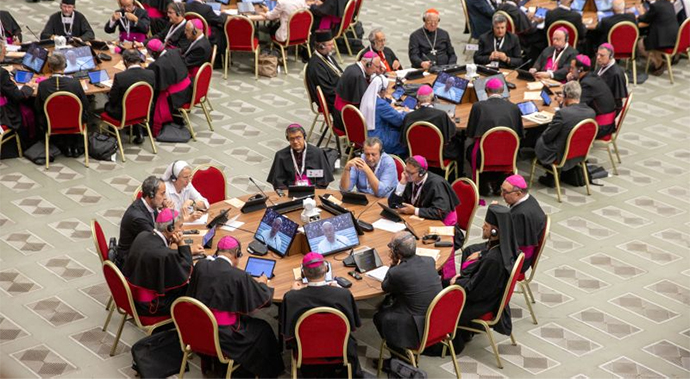- Feb 5, 2002
- 166,633
- 56,267
- Country
- United States
- Faith
- Catholic
- Marital Status
- Married
- Politics
- US-Others
Two weeks in, it must be asked whether the Synod’s methodology is conducive to serious conversation characterized by the parrhesia – the frank speaking – so often recommended by Pope Francis.
The first session of the “Synod on Synodality,” currently meeting in Rome, is slated to be followed by a second such month-long affair in October 2024. Both aim to build a “Synodal Church of Communion, Participation, and Mission,” which is certainly a laudable goal. Two weeks into Synod-2023, however, it must be asked whether the Synod’s methodology is conducive to serious conversation characterized by the parrhesia – the frank speaking – so often recommended by Pope Francis.
The Catholic Church has held synods since 1967, two years after Paul VI created the Synod of Bishops. No one involved in these gatherings over the past half-century is likely to argue that a perfect method for making synods interesting, effective, and humanly bearable has ever been devised. Rhetoric can, and has, gotten out of control: one weary cardinal, asked after the first week of Synod-2001 whether everything had been said on the synod’s topic, replied. “Yes, everything has been said. But not everyone has said it.” Different methodologies – more open discussion in general assembly; more small-group discussions, openly structured; – have been tried. None has proven completely satisfactory.
However, what is particularly striking about Synod-2023 is how closely micro-managed its small-group discussions are. The synodal Instrumentum Laboris (Working Document) includes thirty-three single-spaced pages of “Worksheets” through which the small groups are to make their way, question-by-question, in precisely time-calibrated segments monitored by “facilitators” appointed by the Synod General Secretariat. Whether this method of discussion-management (or discussion-control) will prove an improvement over previous synodal methodologies remains to be seen; the odds seem long to me.
This raises the question of whether the discussion might be gingered up if the prescribed questions, which are largely focused on issues of intra-Church process as defined by the (secular) criterion of “inclusivity,” were complemented by dropping questions of a more substantive, Christian nature into the conversation. Happily, such a set of questions was suggested by Archbishop Joseph Naumann of Kansas City, Kansas, which I found in a statement by the International Catholic Jurists Forum published in the National Catholic Register. If I may paraphrase:
Does the call of Christ for repentance, with which the Lord began his public ministry (cf. Mark 1.15), necessarily create an ecclesial culture of “exclusion”?
Continued below.

 www.catholicworldreport.com
www.catholicworldreport.com
The first session of the “Synod on Synodality,” currently meeting in Rome, is slated to be followed by a second such month-long affair in October 2024. Both aim to build a “Synodal Church of Communion, Participation, and Mission,” which is certainly a laudable goal. Two weeks into Synod-2023, however, it must be asked whether the Synod’s methodology is conducive to serious conversation characterized by the parrhesia – the frank speaking – so often recommended by Pope Francis.
The Catholic Church has held synods since 1967, two years after Paul VI created the Synod of Bishops. No one involved in these gatherings over the past half-century is likely to argue that a perfect method for making synods interesting, effective, and humanly bearable has ever been devised. Rhetoric can, and has, gotten out of control: one weary cardinal, asked after the first week of Synod-2001 whether everything had been said on the synod’s topic, replied. “Yes, everything has been said. But not everyone has said it.” Different methodologies – more open discussion in general assembly; more small-group discussions, openly structured; – have been tried. None has proven completely satisfactory.
However, what is particularly striking about Synod-2023 is how closely micro-managed its small-group discussions are. The synodal Instrumentum Laboris (Working Document) includes thirty-three single-spaced pages of “Worksheets” through which the small groups are to make their way, question-by-question, in precisely time-calibrated segments monitored by “facilitators” appointed by the Synod General Secretariat. Whether this method of discussion-management (or discussion-control) will prove an improvement over previous synodal methodologies remains to be seen; the odds seem long to me.
This raises the question of whether the discussion might be gingered up if the prescribed questions, which are largely focused on issues of intra-Church process as defined by the (secular) criterion of “inclusivity,” were complemented by dropping questions of a more substantive, Christian nature into the conversation. Happily, such a set of questions was suggested by Archbishop Joseph Naumann of Kansas City, Kansas, which I found in a statement by the International Catholic Jurists Forum published in the National Catholic Register. If I may paraphrase:
Does the call of Christ for repentance, with which the Lord began his public ministry (cf. Mark 1.15), necessarily create an ecclesial culture of “exclusion”?
Continued below.

